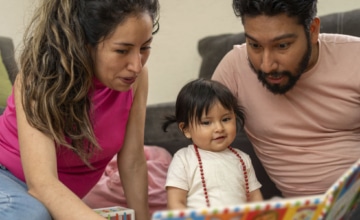It happens to every couple—an angry moment, a disagreement, a hurt feeling.
Being a coparent means that conflicts will arise, whether they are about your child, your relationship, or something else. (A friend of mine recently described an argument with her spouse about the appropriate size of pancakes.) Many parents wonder whether they should air disagreements in front of their young children. The answer is more complicated than you may think.
What’s the problem with arguing in front of my child?
The myth: We used to think that babies and toddlers are too young to understand when adults are fighting and that they don’t remember fights even when they are loud and stressful.
The facts: We now know that parental fighting has an impact on babies, toddlers, and even babies still in utero.1 Any time young children are exposed to stress, their fight/flight response kicks in, flooding their brains and bodies with hormones like adrenaline and cortisol. When young children are exposed to stress frequently, their brains may begin to re-wire to produce a stress response more and more frequently.2
What does this mean for children’s behavior? Children who have been regularly exposed to stressors (like yelling, hurtful words, and aggression between parents) are more likely to experience developmental delays, aggression toward others, or problems sleeping and learning to use the toilet. An overactive stress response can affect children as they grow up, leading to problems with school and learning, communication, and social relationships.3
Does this mean you should never argue when your child is present?
The answer depends on what kind of argument you’re having.
Remember—you and your coparent aren’t just teaching your child to talk and use the potty. You’re teaching them how to build and sustain relationships. How you resolve conflict teaches your child how they can resolve conflict. You’re also teaching your children how relationships are supposed to be and feel. If arguments with your coparent are low stress and respectful (no yelling or name calling), they can be learning moments for your young child.
If an argument is happening in front of your child:
- Reassure your child. Even if your child is quite young, help them to understand that parents disagree because they are working to find a way to solve a problem. “Mama and Papa are talking through the best streets to take so we can get out of this traffic jam.”
- Remind children that they are not the cause of the argument. Young children may assume that something they have done has caused the argument or that they are the reason adults are mad at each other. Try saying something like “Mommy and I are trying to figure out how to put this desk together. I know we sound angry. We are talking about our feelings so we can work this out. We aren’t mad at you! We both love you and don’t want to scare you. You will always be safe when you’re with us.”
- Keep your cool. If either parent becomes angry or the argument escalates, agree to stop and continue the discussion when your child is not present.
- Focus on a solution. You’re less likely to lose your temper and more likely to demonstrate healthy conflict resolution for your child. Start with a shared goal (“We both want him to learn to sit at the table during meals”) and then suggest a practice you can both agree on (“Can we agree that he sits for 10 minutes, after which we let him down and he can play in the kitchen while we finish eating?”).
- Be respectful. Be respectful of the other parent and their point of view. Try to keep an open mind and understand how they see the situation.
- Notice your child. Pay attention to how your child reacts to the argument. Do they seem tense or afraid? If so, stop the conversation and suggest to your coparent that the two of you continue it later. Every child is different, and some may not be able to manage the stress of witnessing even a minor disagreement.
You don’t have to avoid arguments in front of your young child, but make sure that exposure to stress is minimal. Keep things civil and see the situation through your child’s eyes. Doing so can help teach your child one of the most important social skills there is: healthy conflict resolution.
Citations:
1 Jensen, S., et al. (2018). Associations between prenatal, childhood, and adolescent stress and variations in white-matter properties in young men. Journal of Neuroimaging, 182, 389–397.
2 Roberts, Y., Ferguson, M., & Crusto, C. (2013). Exposure to traumatic events and health-related quality of life in preschool-aged children. Quality of Life Research, 22(8), 2159–2168.
3 Westrupp, E., Brown, S., Woolhouse, H., Gartland, D., & Nicholson, J. (2018). Repeated early-life exposure to inter-parental conflict increases risk of preadolescent mental health problems. European Journal of Pediatrics, 177(3), 419–427.
INSERT CTA BOX





